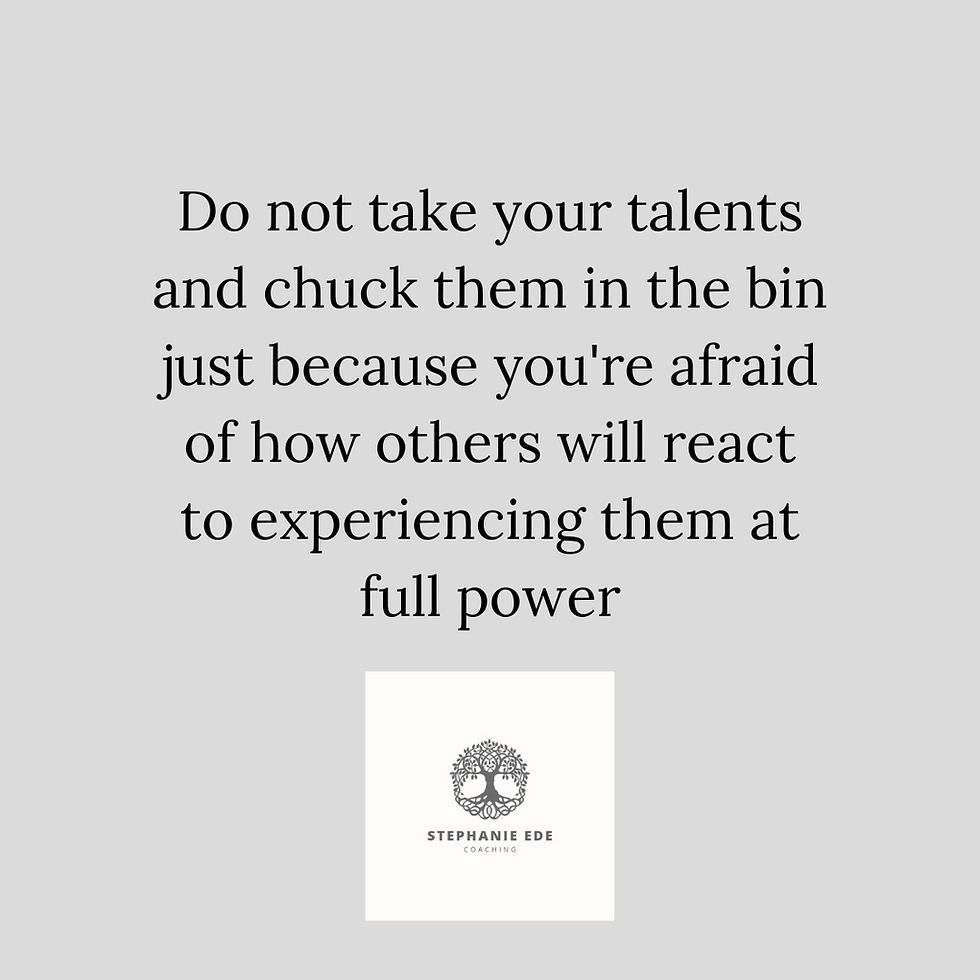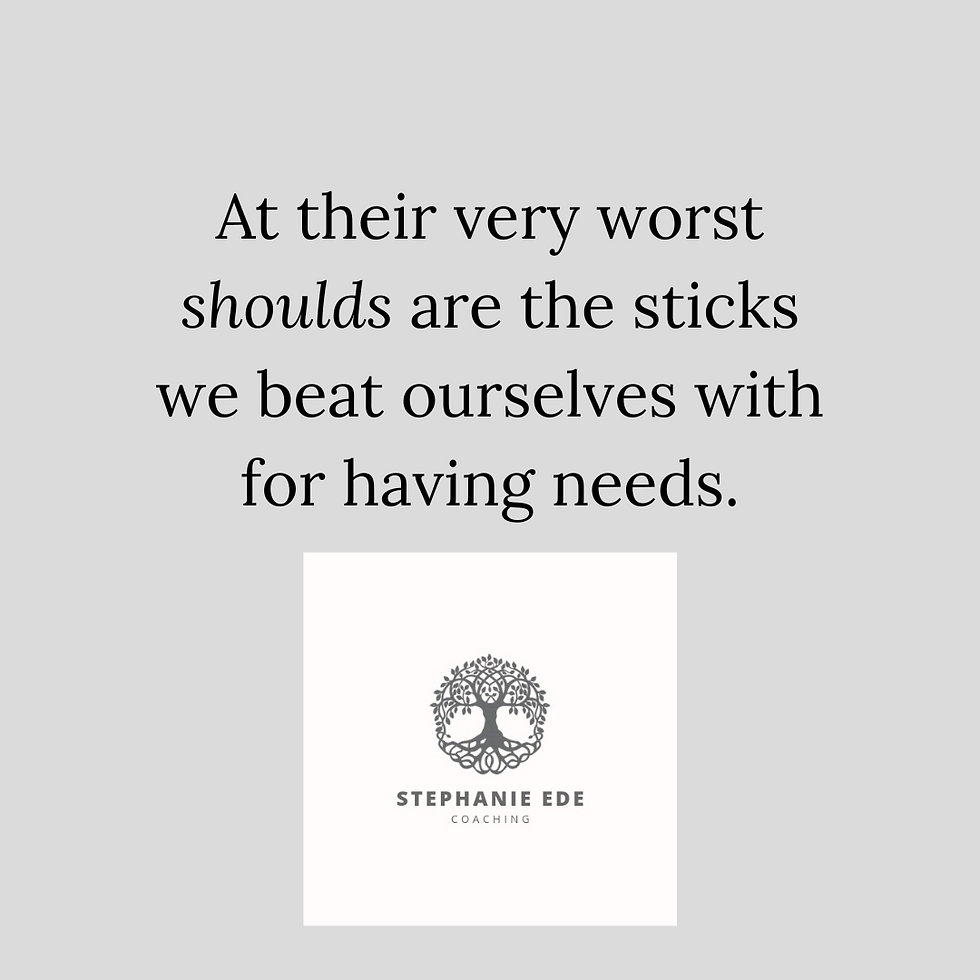Letting Go and Finding Peace
- stephedecoaching
- Jul 7, 2023
- 5 min read

I’ve been wanting to write about the topic of letting go for a while but have struggled to formulate my thoughts around it. Today, serendipity intervened. I met a woman in the park. Let me tell you about her…
I was on my way back from a trip to the city centre for fruit and veg. It was a beautiful day – warm, sunny, humid and a bit hazy, and I was enjoying the way the dappled light was dancing through the tree canopy of Mowbray Park. I became aware of a lady on a mobility scooter coming up alongside me – she’d been doing her shopping, too, judging by the carrier bags in the footwell. I turned, smiled and said ‘hello’. She slowed down her scooter to my walking pace and smiled at me. But it wasn’t a carefree smile. It was an ‘I want to tell my story’ smile. So I stopped, said ‘It’s a lovely day, isn’t it?’, and the floodgates opened.
For weeks now this lady had been searching for an elderly gentleman who had verbally abused her one day for riding her mobility scooter in the park. She wanted to give him a piece of her mind. She told me it was disturbing her sleep, she couldn’t stop thinking about it, she was angry all the time. She went on to tell me she had arthritis in both hips, so can't walk far, and she loved the park. She’d visited the park since she was a little girl, but now she just felt angry when she was in it.
Can you see what’s going on here?
This poor woman had, for weeks, been tormenting herself over the actions of another person, which she couldn’t change or control. Her lack of power was tormenting her.
She has allowed this gentleman’s anger, which was likely nothing to do with her, to dominate her life for weeks.
And she was now solely visiting the park she has loved all her life in order to have an argument with someone she would most likely never see again, which was reinforcing her resentment.
She had taken on the role of tormentor from that person, because they were no longer around to do the tormenting so she was now using the incident to torment herself.
So what did I say to her?
Firstly, I empathised with her situation. Almost everyone at one time or another will have experienced something like this and it’s demeaning and confusing to be treated in a way that you don’t feel you deserve when you’re doing nothing wrong. And she obviously lives with chronic physical pain and restriction, which can often mean situations like these feel like even more of an attack due to our physical vulnerability. But I gently suggested to her that the elderly gentleman may have been struggling with his own emotions or even mental health issues that day, and while that doesn’t excuse bad behaviour, it makes it far less personal. Of course, he could have also been the type of person who enjoys hurling abuse. She could never know, but she was assuming motivation without evidence.
She then said to me, ‘Well I hope he doesn’t have a wife and treat her like that’. She had thought about this so much that not only was she assuming motivation but she had also begun to create a whole story around it. I suggested to her that it doesn’t matter whether he does or doesn’t have a wife. That it’s not her concern. And that she’ll most likely never find out one way or the other.
Then I took the plunge. I said, ‘You can choose to not lose sleep over this, you know.’ Because the original incident was weeks old yet it was dominating her life. SHE WAS DOING THIS TO HERSELF.
‘But I just want to tell him what he’s done to me,’ she replied.
And there we have it. She wanted closure on her terms. I’m afraid, in the real world, we rarely get closure, and almost never on our own terms. We have to make our own closure. We have to make our own peace. In this lady’s case, she would almost certainly never see this gentleman again – she had been looking for him for weeks without success, after all. Only she was going to bring it to an end, because he had let go of it energetically the moment he had stopped shouting at her. But she grabbed the ball off him and ran with it. And kept on running. In all likelihood he would probably not even remember what had happened even if she did find and confront him.
The saddest part about this story, for me, was that she now associated a place that she had loved since she was a little girl with grievance, anger and resentment. She no longer saw the well-tended flowerbeds or the beautiful mature trees or the rabbits nibbling on the grass when she went in there, because she was on a mission to right a wrong.
Do I blame her for feeling angry and resentful? No. Do I blame her for wanting to have her say? No. Do I blame her for clinging on for too long to something that is not serving her? I’m not in a position to blame her as I’ve done it myself. More times than I would care to remember.
The point is, in holding on to past pain and a sense of injustice we only harm ourselves. And we are doing it to ourselves. The logical extension of this is that we can stop doing it to ourselves. But how?
First, we forgive. This can be the hardest thing in the world if someone has abused us, lied to us, cheated us of what is rightfully ours, or robbed us of our peace. But we don’t do it for them, we do it for us because it is a necessary part of letting go. Because here’s the thing. We can’t change any of what has happened. But we can go into the future without the burden of resentment.
Second, we reframe. For example, how different does this encounter look if the elderly gentleman had lost his dog last week because someone on a mobility scooter had hit it on the path? That probably didn’t happen, but it might have. Or something else may have been causing that gentleman emotional pain or triggered him. Whatever, reframing can help us come to the realisation that what has happened was probably not about us at all. And there’s freedom in that. What about the emotionally unavailable partner who constantly fails to meet our needs? Do you really think they become a completely different person when they are with someone else? Of course they don’t. They may find someone who’s more willing to put up with their emotional unavailability, but that’s not the same thing. Or the boss who picks at everything you do. Look around your workspace and you’ll find they’re doing it to everyone to one degree or another. The point is, it’s probably nothing to do with you.
Lastly, we prioritise our peace. When we cling to situations that do not serve us, that we cannot change and that cause us emotional pain, we rob ourselves of valuable energy, intellectual bandwidth, and motivation that could be funnelled in far more life-enhancing and positive directions. How much nicer for that lady if she had been riding through the park today because she wanted to enjoy the beauty of nature and the lovely weather, rather than looking for a fight.
Letting go is hard. But clinging on is harder. Consider that and take these three steps to allowing your peace back in.



Brilliant advice. Something familiar to all of us, so these strategies are really useful. Thank you.